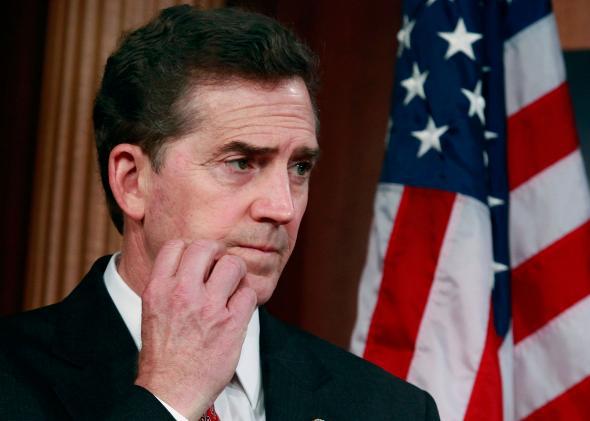Josh Green interviews Heritage Foundation President Jim DeMint upon the completion of the organization’s campaign for Obamacare defunding. He asks a good question; DeMint gives an answer that makes sense until you think about it for three seconds.
“What happened in 2012 was that there was a void of any inspiration, any attempt to lead. It certainly wasn’t because the party was too conservative—it was because there was no conservative leadership at all!”
DeMint thinks the election results don’t accurately reflect national sentiment and therefore can’t be used to argue against his desire to move the party to the right. True conservatism never got a hearing—particularly not in regard to Obamacare, which was, after all, modeled after a Massachusetts law signed by Romney. “Because of Romney and Romneycare, we did not litigate the Obamacare issue,” he says.
This is an extraordinarily popular sentiment, one that predates the Romney nomination itself. Rick Santorum would frequently tell audiences that Romney was “the single worst Republican to run on the issue of Obamacare” because he’d be tripped up talking about Massachusetts. Romney calmed the mob when he won the first presidential debate and deftly handled the Romneycare question. And then he lost, and nothing was forgiven.
But to hear DeMint say this is a little bit too revisionist. DeMint endorsed Romney for president in 2007, after “Romneycare” had passed. He explained at the time that Romney’s great victory in getting a sensible health plan through a Democratic legislature was high atop the list of reasons for his move.
“[Romney] has demonstrated, when he stepped into government in a very difficult state, that he could work in a difficult partisan environment, take some good conservative ideas, like private health insurance, and apply them to the need to have everyone insured,” DeMint said. “Those kind of ideas show an ability to bring people together that we haven’t seen in national politics for a while. We don’t need the nation to be more polarized.”
Four years later I got the chance to ask DeMint—who did not endorse Romney in the 2012 primary (he stayed neutral)—why he didn’t ring any alarms about Romneycare.
“I got involved with him before that,”* DeMint explained, “and the concept that was presented to me was the idea of moving people from government plans to private plans. That’s what the goal was. That’s how my conversations went, and that’s how it was presented. But the way it ended up … ” he paused to think about about this. “I cannot accept all the mandates, all the government exchanges. And it hasn’t worked. I think the goal of figuring out how you can move people from government policies to private insurance policies is a good goal. That’s one of the things that attracted me to what he was trying to do. Frankly, with the Democratic legislature in control there, I just think the way it ended up, we wouldn’t want it in our state or our country.”
So you can think, “Hey, DeMint evolved once he saw how bad the law was”—that’s fair. Or you can marvel at how far the official conservative position moved once the Romney proposal went national.
*Romney left office in January 2007, the health care bill fresh off his desk and into law. DeMint endorsed him after this.
